#Tlingit language
Text
im confused about things like fans of K-Pop who only speak english & dont really understand what their listening to w/out english translation in front of them-
I get it now lol this shit catchy & i understand like less than Jinkaat words lol (subtitles recommend)
Update: his name on youtube is Air Jaz listen to him now 🔫
youtube
youtube
youtube
Ixsixán (i love you), Gunalchéesh (thank you), Eeshàan (I FINNALY KNOW HOW TO FUCKING SPELL IT DEAR FUCKING GOD, it basically means "oh you poor thing"), Jinkaat (Ten), Yéil (Raven), Ch'aak (Eagle)
#Tlingit#Lingit#Łingit#alaska native#native pride#native american#youtube video#youtube#ndn tag#ndn#native#indigineous people#indigenous#ndn tumblr#indigenous peoples#indigenous people#indigenous art#native music#Alaska native music#Tlingit language#Tlingit music#southeast alaska#alaska#music video#music recs#songs#music#tunes#rap#rap music
7 notes
·
View notes
Text

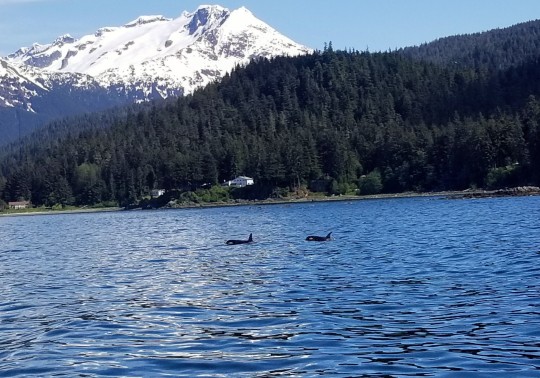
Asx̱'éex̱an kéet yaa has kawduwax'aak
Killer whales (AG Pod) swimming near Eagle Beach, Alaska
1 note
·
View note
Note
i must admit i know nothing of welsh history or language. im reclaiming learning the irish language bc i know the history of it and bc i think it's essential to protect native languages of various places. but as someone who doesn't know welsh history, i see "its not like welsh people were beaten for speaking it" and i recoil in a sense of distaste. because while i may not know the history, i very much doubt no one ever in the world has been beaten for speaking welsh, that's a pretty huge assumption to make even if a language isn't being legally oppressed (assuming thats what op really meant). but also, i just loathe the idea that only minority languages are worth saving or caring about if they're being beaten out of people. genocide happens in many ways and only some of them are actually active violence/assault, most are subversive, and purposefully so
idk if i should even be speaking on this bc i dont know the history of welsh but i feel like you literally dont need to know the history behind it to see something very wrong with "speakers of a minority language should shut up if they're not actively being killed for it"
Sorry I took so long in getting to this ask (post anon is referring to) but yeah- that post was gobsmacking to me as a Welsh speaker. I've studied language loss and revitalisation and I can name several endangered languages in which children (and adults) were beaten and abused for speaking their native tongue. For example, we covered the Tlingit language in Alaska (one of the few North American languages I've studied) which is subject to a revival- some Tlingit wanted to learn the language, while others (usually older people) had an aversion to the language. One man said that whenever he speaks Tlingit he can taste soap because he was punished as a boy for speaking Tlingit by having a bar of soap put in his mouth. Language loss via abuse is real and prevalent in many, many endangered languages. The audacity to assume Welsh is somehow immune to that was astounding.
But even if Welsh *was* immune to that somehow (it wasn't) you're right in that we should care about the decline of a language even if it doesn't involve overt suppression. More surreptitious kinds of linguistic genocide lie within the state apparatus. For example, when Wales was merged into the Kingdom of England (see: the Laws in Wales Acts 1535 and 1542) the language of the legal system in Wales was changed to English-only, depriving monolingual Welsh speakers (Welsh was spoken in pretty much every part of Wales at this point) of legal services. This meant that Welsh speakers were effectively pressured indirectly to learn English in order to have a chance at any legal services in court. Over time, the privileging of English over Welsh created a pressure to abandon Welsh in favour of English, because there were 'more opportunities' in English than in Welsh.
Similarly, the true Treachery of the Blue Books wasn't that the British Government in 1847 had ordered a review into Welsh schools and found that too many people were speaking Welsh- but that Welsh-speaking parents began to forbid their children from learning Welsh and supported the findings of the inquiry because they too had felt that pressure of English-language supremacy. Believing that there's more opportunities in English than in Welsh. It's an unfortunate legacy and attitude which still persists today- and none of the Commissioners of the Blue Book Inquiry shed any blood in doing so. But the impact was nonetheless dire. It's also a self-creating cycle: There are no opportunities in Welsh -> People learn English instead of Welsh for opportunities -> There's fewer Welsh speakers to create more opportunities in Welsh ->There are no opportunities in Welsh.
But yeah, I have no idea what the OP of that other post was thinking but it was offensively ignorant in any case. I'm glad though that Welsh's struggles are seen by others at least, in this day and age.
#cymraeg#welsh#ask#gofyn#cwesitiwm#genocide cw#language revitalization#language loss#tlingit#abuse cw#cultural genocide#cwestiwn
97 notes
·
View notes
Text
Question

is this a decent lower arm tattoo? I'm gonna trace it out at some point to simplify out the design and adjust the font (I made the patternwork for a bigger and higher detail print area so I think I need to go over it with a relatively thick pen and scrap some of the fine detail, especially on the large wolf which even at this level of detail is a bit fussy)
Aiming for it to be a band covering around half my lower arm, so about 10-12cm across
#red said#I'm also worried about whether it's an appropriate thing to get tattooed#bc it is an original My Design buuuut it's based on a lot of very specific visual languages from cultures I'm not part of#several of which have very specific spiritual and religious significance attached to the design languages#i think I'm overthinking it bc it isn't meant to be In The Style Of any specific cultures even though it's drawing partial inspiration#but idk it's important to be on the level about that stuff if you commit to getting it inked on your own skin#for reference the cultures are rus COMMA norse COMMA and tlingit#with a tiny bit woven in from nepalese design work#bc the design is meant to evoke Fantasy Country In SubArctic Frigid Temperate Zones#so for all the design work in the RotE project i tried to draw on cultures from multiple continents in similar landscapes#to make fictional design vernaculars that suited the flavour of the fantasy cultures without defaulting to Medieval Europe#but idk i think that design fusion means different things in that context#vs as out of context pattern work
23 notes
·
View notes
Text
The confusing way georgian forgoes the “mama = mother” “papa/baba = father” universal and has “მამა (mama)” meaning father and “დედა (deda)” meaning mother…..our subversive slay
#I asked the prof abt it and she didn’t have a lot of info on it#I’m doing some research and there’s a few other languages that kind of go against the norm#it’s so fascinating I wanna know why#bc it makes sense why mama would be mother right#easiest sound for a baby to produce#mom is the closest and gets to keep that one#dad gets the second most easy to produce#but why are these some exceptions#or perhaps rather why is the norm SO widespread?#also I know there are languages that don’t have m and p sounds (like tlingit….but don’t quote me on that)#my question then is not only what words for parental THEY use. but also why they don’t have m and p/b sounds at all#since every baby produces them…at the very least ‘m’#ok idk idk im gonna stop typing and go back to looking it up#teehee
2 notes
·
View notes
Text
The Tsimshian 3: Corey Moraes on Meaning and Cultural Knowledge (3)
Publisher: In-Sight Publishing
Publisher Founding: December 1, 2014
Web Domain: http://www.in-sightpublishing.com
Location: Fort Langley, Township of Langley, British Columbia, Canada
Journal: In-Sight: Independent Interview-Based Journal
Journal Founding: August 2, 2012
Frequency: Three (3) Times Per Year
Review Status: Non-Peer-Reviewed
Access: Electronic/Digital & Open Access
Fees: None…
View On WordPress
#abalone#Alaska#asia#Corey Moraes#culture#Europeans#Eyak#Haida#language#Lax Kw&039;alaams#Prince Rupert#Skeena River#Terrace#Tlingit#Tsimshian#William Duncan
0 notes
Text
Photography: Nicholas Galanin's "In Every Language There is Land"/"En cada lengua hay una Tierra," Brooklyn Brige Park 5/28/23
Photography: Nicholas Galanin's "In Every Language There is Land"/"En cada lengua hay una Tierra," Brooklyn Brige Park 5/28/23 @SilverJackson @bbpnyc
Photography: Nicholas Galanin’s “In Every Language There is Land”/”En cada lengua hay una Tierra,” Brooklyn Brige Park 5/28/23
Nicholas Galanin is a Sitka, AK-born, Tlingit and Unangax̂ multi-disciplinary artist and musician, whose work frequently explores a dialogue of change and identity between Native and non-Native communities. Galanin adapts aspects of pop art and minimalism, such as…

View On WordPress
#artwork#Brooklyn Bridge Park#Nicholas Galanin#Nicholas Galanin In every language there is Land/En cada lengua hay una Tierra#Photo Essay#Photography#Tlingit#Unangax̂
0 notes
Text
Weekend links, April 7, 2024
My posts
This week feels like it has been a hundred years long (not in a bad way).
Somehow we joined together to balance the seesaw just right so Ava Gardner and Jean Seberg could both go through in the Hot Vintage Lady polls (percentages rounded). Like, I’m wearing the Ava jersey and even I encouraged people to vote Jean when necessary. Honestly, I just wanted to see if it could be done. And it COULD.
Round three has begun. It is already horrific. This is the first round that’s really going to hurt because we spent the last one really getting down in the dirt and championing our ladies, or learning about actresses we’d never heard of before and getting attached to them. And now? We are reminded: memento mori. Everyone loses but one.
(I personally pitched in for Sara Montiel. “BUT JUST LOOK AT--” Yeah, I did, thanks.)
Reblogs of interest
April Fool’s Day: You were here for the Boopening, yes? The whole thing was that you only got badges for giving boops, not receiving them, which is a great way to not reward popularity contests, but also means that every last one of us was out here trying to figure out who to bap with a cat’s paw 1000 times. I said, listen, my notifications are already trash garbage today. I’ll take the bullet. Boop at will.

The Activity graph isn’t too clear on this point, but it looks like I had something like 65,000--hits? engagements? boops?--that day. Listen, I got the black paw badge too. We all did what we had to do in the Boopening.
A Shakespearean boop of goodly length: “And, Meowntague, come you this afternoon, to know our further pleasure in this case, to old Food-bowl, our common judgment-place.”
I had to go lie down awhile after a pun like “The Purrge.”
--
I had just gotten up from that pun and then I had to go lie down again.
Account security gothic
The Canada griffin
Dinotopia nostalgia
Two pairs of spectacles, one made from slices of emerald, and the other from slices of diamond
An old favorite: Cerberus as a puppy, guarding the gates to heck
I feel like these two posts have the same energy: Time cops will not let you travel back to the Titanic and bloodthirsty gazebos are currently in a dormancy period.
The birds are still troubled
PSA: The best sunscreens for your face
Video
A collection of various American Indian/indigenous American languages, including Navajo, Tlingit, Lakota, Colville Okanagan Salish, Cherokee, Yucatec Maya, Greenlandic, Mohawk, Yup'ik, and Mi'kmawi'simk.
A trans health-and-wellness fundraiser (Mercury Stardust, Point of Pride, and friends) kept getting banned off Tiktok due to assholes. Here’s how to donate; I saw a few “here’s how they helped me” notes, so it seems like these programs are both legit and effective.
You think you’re going to sit staring at this video because Chocolate Guy is weaving chocolate. Then you get into it, and it just keeps going.
“Too Sweet” is doing hilariously well on the charts for a song that didn’t even make the album proper. Hozier’s bees would like to thank you for your support.
I know I said that Stevie Nicks would make you sing backup on your own haunting, but late in this 1997 live performance of “Silver Springs,” she makes Lindsey Buckingham, the man she wrote this song about, look her in the eye while she belts it at him. This specific performance was released as a single (I was there, Gandalf) and nominated for a Grammy. Watch the video and you will see why.
The Women Those ‘Evolution Of Beauty’ Videos Leave Out
I don’t really know how to describe this rubberhose-style cartoon of Cab Calloway as a singing nightmare clown. Betty Boop is also there. “You just described it!” No, I really didn’t.
How movable type worked 1000 years ago, from scratch.
Unrestrained seasonal yak fun
A snowy raven photoshoot
The sacred texts
I don’t know how to explain this double Sacred Text about ominous dreams that comes with its own comic, except to say that they’re so iconic that I first saw both posts in lo-res Pinterest screencaps.
April Fool’s: The ultimate sacred text.
Personal tag of the week
Wet beast Wednesday, which had both a headshake stickflip and bears on a swan boat.
32 notes
·
View notes
Text

Sitka… Alaska’s first capital, formerly known as Novo Arkhangelsk (or new archangel); also the biggest city in the U.S by area, four times the size of Rhode Island… I did try to implant tlingit physical features but I swear I’ll get better at it 😼 I also read the tlingit did trade before European contact as far south as Northern California, so I think that’s pretty cool; Also Alaska is home to 90% of the worlds sea otter population, I think that’s pretty cool as well (I imagine Sitka has hazel eyes) Sitka’s design is probably gonna change a few times idk yet but I’m content with this so far, I’d like to hear more ideas if y’all got some
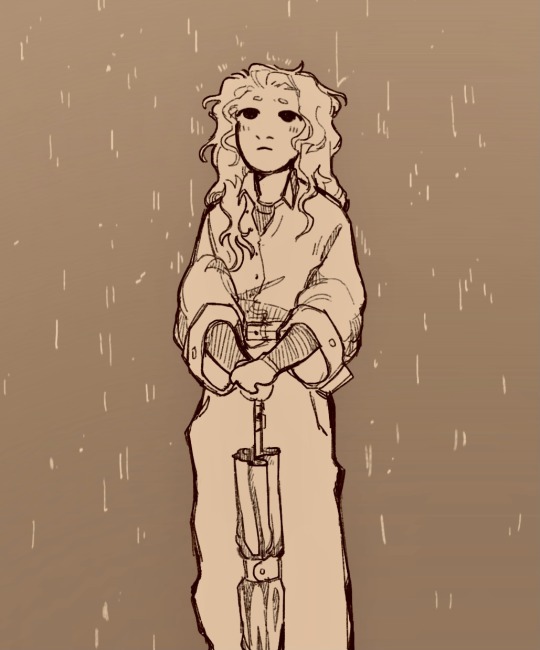
I like to imagine that since Sitka has a tree named after them Sitka can stand perfectly still for hours on end.
Also I read in Sitka it rains 2/3 days throughout the average year that’s why I drew that 🤷
some random other things, I imagine it’s terribly tough to tell what Sitka is thinking almost all the time, again cuz of Sitka spruce trees, although there’s a handful of things named after Sitka I like the idea of her being the equivalent of a plant/tree, and you don’t know what a plant is thinking even if they don’t; cuz it’s generally a thing in Alaskan culture to be able to talk without talking— not sign language, but simple gestures, I’ve read about it and it varies per Alaska region but not having to be vocal seems to be a common thing, and also cuz it’s a widespread belief in all alaska native cultures that everything and everyone has a spirit/soul so they are taught to treat everything with respect
I also like to think Sitka is like an older sibling to Alaska, not literally, just like
#I love ranting you guys i love info dumping i swear im normal#wttt#welcome to the table#welcome to the statehouse#ben brainard#wttt fan art#wttt alaska#wttt fanart#wttt headcanons#wttsh#wttsh alaska#wttt sitka#wttsh sitka
79 notes
·
View notes
Photo
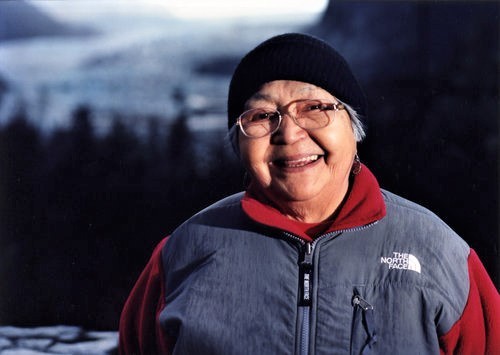
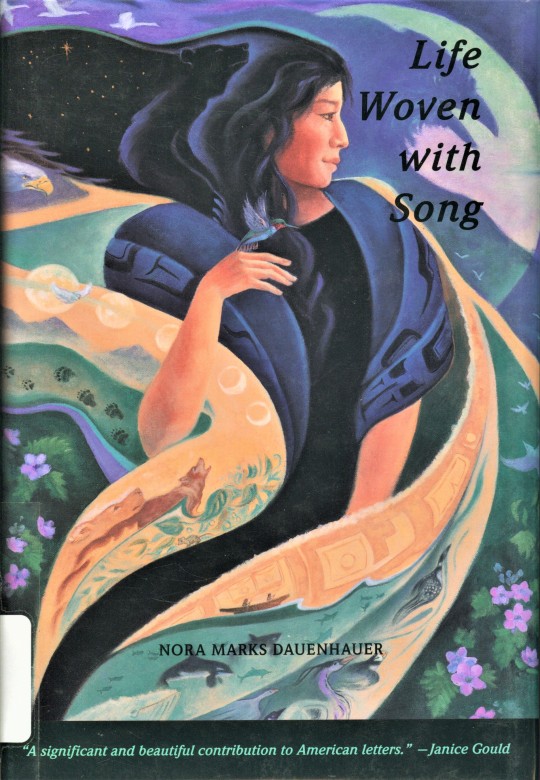



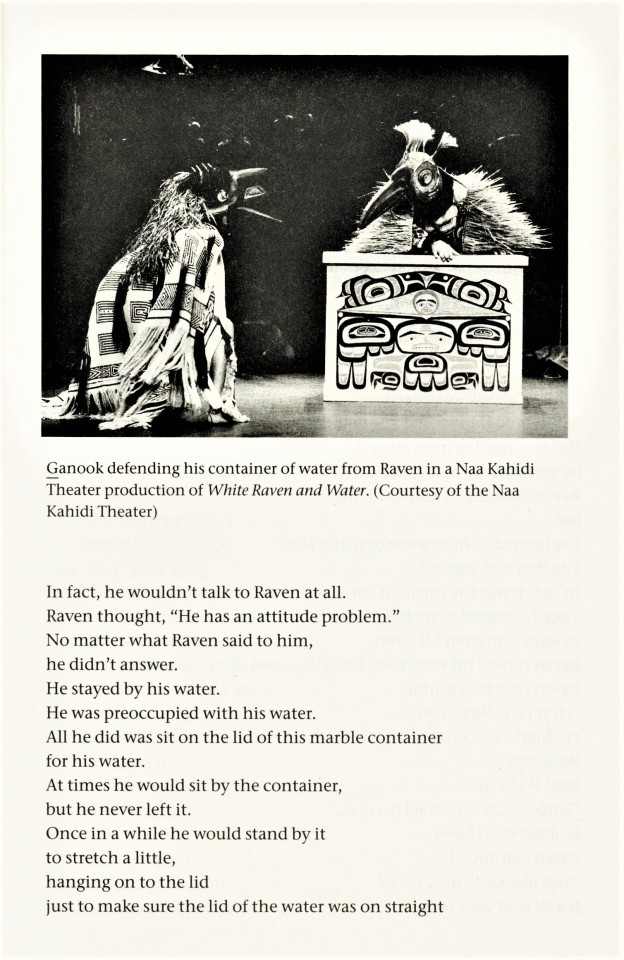
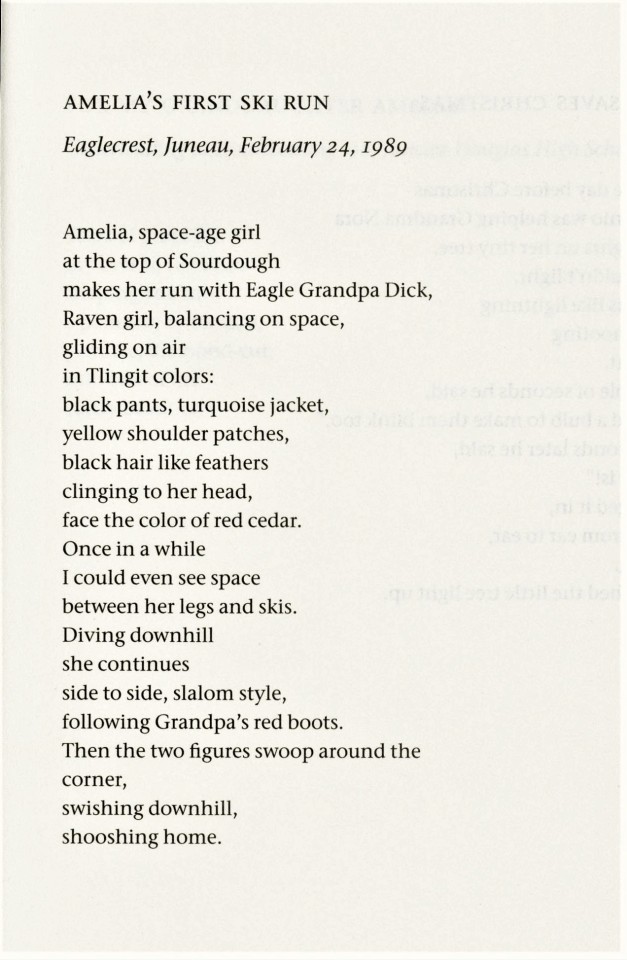
Native American/First Nations Woman Writer of the Week
NORA MARKS DAUENHAUER
Continuing on our trek through what remains of March, I offer you another Indigenous woman writer, Nora Marks Keixwnéi Dauenhauer (1927-2017), a Tlingit writer from Juneau, Alaska. Born in Juneau, Dauenhauer grew up there as well as in Hoonah, Alaska with a father who was a fisherman and carver, and a mother who was a beader. Dauenhauer lived at times with her parents on a fishing boat and in seasonal camps. Being a member of the Tlingit tribe, her first language was Łingít, and she did not learn English until she was eight.
Following her mother in the Tlingit matrilineal system, she was a member of the Raven moiety of the Tlingit nation, of the Yakutat Lukaax̱.ádi (Sockeye Salmon) clan, of the Shaka Hít or Canoe Prow House, from Alsek River. She was chosen as clan co-leader of Lukaax̱.ádi (Sockeye Salmon) in 1986 and as trustee of the Raven House and other clan property. She was then given the title Naa Tláa (Clan Mother) in 2010, becoming the ceremonial leader of the clan.
Dauenhauer earned a BA in anthropology from Alaska Methodist University in Anchorage. In the early 1970s, she married poet and Tlingit scholar Richard Dauenhauer and together they made significant contributions to preserve the Tlingit oral traditions in their Classics of Tlingit Oral Literature book series. Nora Dauenhauer became a Tlingit language researcher for the Native Language Center at the University of Alaska, Fairbanks from 1972-1973, and then became the principal researcher in language and cultural studies at the Sealaska Heritage Foundation in Juneau from 1983-1997.
On the subject of preserving the Tlingit oral tradition and its importance, Dauenhaur said:
People are now beginning to take action for language and cultural survival, and my work is to help provide inspiration and tools for this through my writing.
Dauenhauer had several accomplishments, including being named the 1980 Humanist of the Year by the Alaska Humanities Forum. Together, the Dauenhauers were awarded the Alaska Governor’s Award for the Arts, two American Book Awards, and a Before Columbus Foundation American Book Award. In 2005, Nora Dauenhauer was the recipient of the Community Spirit Award from the First People’s Fund.
As a poet, Nora Dauenhauer published two collections, one of which we hold in Special Collections, Life Woven With Song, published by the University of Arizona Press in 2000 (the other is The Droning Shaman, Black Current Press, 1989). This book recreates the oral tradition of the Tlingit people through written language in a variety of literary forms, and records memories of Dauenhauer’s heritage from old relatives and Tlingit elders, to trolling for salmon and preparing food in the dryfish camps and making a living by working in canneries.
Author Photo is by Hulleah Tsinhnahjinnie
See other writers we have featured in Native American/First Nations Woman Writer of the Week.
View other posts from our Native American Literature Collection.
-- Elizabeth V., Special Collections Undergraduate Writing Intern
#Native American/First Nations Woman Writer of the Week#women's history month#Native Americans#Native American writers#Native American women writers#Nora Marks Dauenhauer#Richard Dauenhauer#Tlingit#Life Woven With Song#University of Arizona Press#Alaskan writers#poets#poetry#Elizabeth V.#Native American Literature Collection
136 notes
·
View notes
Text
tlingit language learning videos
I just found out theres a Tlingit tag on here recently so heres some language learning videos I've found helpful :]
My grandpearents moved from Alaska to a different state before my mom's gen was born so were kinda disconnected & we dont speeck tlingit much, so I grew up only knowing a few words & not understanding most of what my culturally connected aunt was saying (I still don't tbh), so I love alot of these videos :]
youtube
#tlingit#indigenous#native americans#Youtube#language#native american#native pride#indigineous people
1 note
·
View note
Text
I always seem to get bogged down in phonology when I'm conlanging. I'm so indecisive because I love open syllable structure like in finnish or in greenlandic. But I also like more consonant heavy languages like Haida, Tlingit, or Nuxalk. I think Nuxalk especially has an elegantly maximalist approach to syllable structure.
I'm thinking of verbs being consonant heavy as I plan to make them dense with grammatical information and nouns to have a more open syllable structure.
30 notes
·
View notes
Text

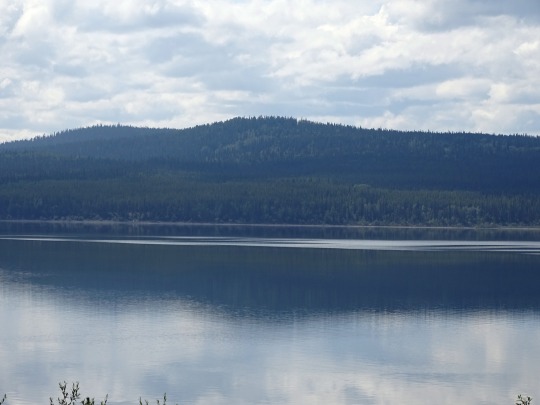

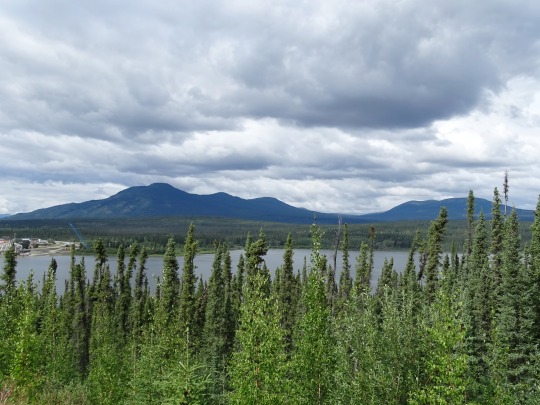
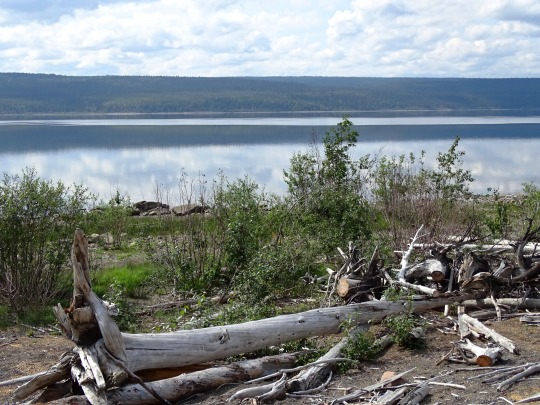
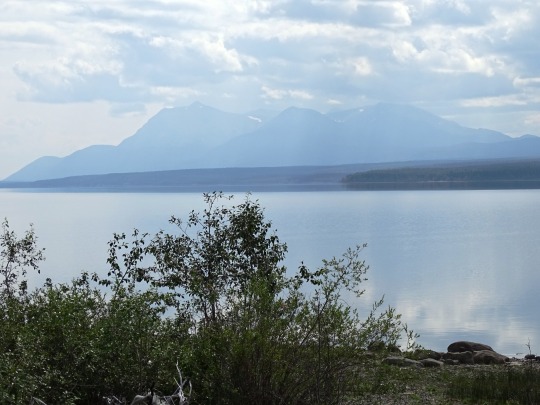

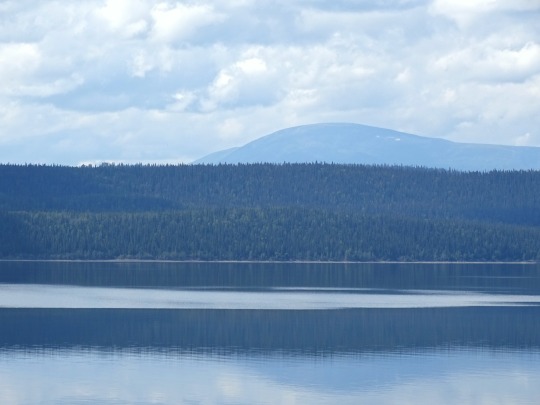
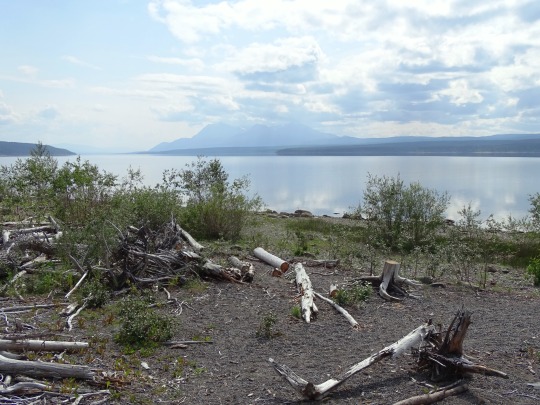
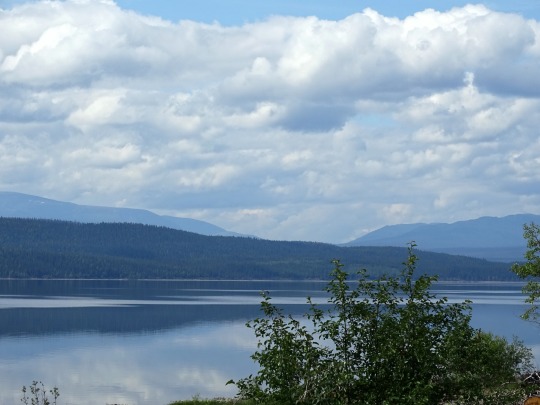
Teslin Lake, YT (No. 1)
Teslin Lake is a large lake spanning the border between British Columbia and Yukon, Canada. It is one of a group of large lakes in the region of far northwestern BC, east of the upper Alaska Panhandle, which are the southern extremity of the basin of the Yukon River, and which are known in Yukon as "the Southern Lakes" (the other major ones in the group are Atlin Lake and Tagish Lake but include Bennett and Lindeman Lakes, the headwaters of the Yukon River itself). The lake is fed and drained primarily by the Teslin River, south and north, but is also fed from the east by the Jennings River and the Swift River, and from the west by the Hayes River.
According to the Yukon Geographical Names Project, "Teslin" means "long water", but in the Tlingit language the local kwaan or tribe of Tlingit is called Deisleen Kwáan", meaning "Big Sinew Tribe".
Source: Wikipedia
#Teslin Lake#Yukon#travel#original photography#vacation#tourist attraction#landmark#landscape#countryside#lake shore#dead wood#drift wood#flora#mountains#Nisutlin Bay Bridge#engineering#woods#forest#nature#pine#fir#clouds#the North#Canada#summer 2023#Alaska Highway#Teslin
14 notes
·
View notes
Text
Saints&Reading: Saturday, April 13, 2024
march 31_april 13
SAINT INNOCENT OF MOSCOW, ENLIGHTNER OF ALASKA ANS SIBERIA (1879)

Icon written by hieroscemamonk Ephrem.
Our father among the saints Innocent of Alaska, Equal-to-the-Apostles and Enlightener of North America (1797-1879), was a Russian Orthodox priest, bishop, archbishop, and Metropolitan of Moscow and all Russia. He is known for his missionary work, scholarship, and leadership in Alaska and the Russian Far East during the 1800s. He is known for his great zeal for his work as well as his great abilities as a scholar, linguist, and administrator. He was a missionary, later a bishop and archbishop in Alaska and the Russian Far East. He learned several native languages and was the author of many of the earliest scholarly works about the natives and their languages, as well as dictionaries and religious works in these languages. He also translated parts of the Bible into several native languages.
St. Innocent, né Ivan (John) Evseyevich Popov-Veniaminov, was born on August 26, 1797, into the family of a church server in the village of Anginskoye, Verkholensk District, Irkutsk province, in Russia. His father died when John was six.
In 1807, John entered the Irkutsk Theological Seminary. In 1817 he married, and on May 18, 1817 he was ordained deacon of the Church of the Annunciation in Irkutsk. He completed his studies in 1818. He was appointed a teacher in a parish school, and on May 18, 1821 he was ordained priest to serve in the Church of the Annunciation.
At the beginning of 1823, Bishop Michael of Irkutsk received instructions to send a priest to the island of Unalaska in the Aleutian Islands of Alaska. Father John Veniaminov volunteered to go, and on May 7, 1823, he departed from Irkutsk, accompanied by his aging mother, his wife, his infant son Innocent, and his brother Stefan. After a difficult one-year journey, they arrived at Unalaska on July 29, 1824.
After John and his family built and moved into an earthen hut, he undertook the construction of a church on the island and set about studying the local languages and dialects. He trained some of his parishioners in construction techniques and with them undertook the construction of a church, which was finished the following July.
Father John's parish included the island of Unalaska and the neighboring Fox Islands and Pribilof Islands, whose inhabitants had been converted to Christianity before his arrival, but retained many of their pagan ways and customs. Father John often traveled between the islands in a canoe, battling the stormy Gulf of Alaska.
His travels over the islands greatly enhanced Father John Veniaminov's familiarity with the local dialects. In a short time he mastered six of the dialects. He devised an alphabet of Cyrillic letters for the most widespread dialect, the Unagan dialect of Aleut and, in 1828, translated the Holy Gospel of St. Matthew and other church materials into that dialect, which were eventually published in 1840 with the blessing of the Holy Synod of the Russian Orthodox Church. In 1829, he journeyed to the Bering Sea coast of the Alaskan mainland and preached to the people there. In 1836, his travels even extended to the south, to the Ross Colony north of San Francisco and to the Spanish missions of northern California. At Ross Colony he conducted services at its small, wooden chapel.
In 1834, Father John was transferred to Sitka Island, to the town of Novoarkhangelsk, later called Sitka. He devoted himself the Tlingit people and studied their language and customs. His studies there produced the scholarly works Notes on the Kolushchan and Kodiak Tongues and Other Dialects of the Russo-American Territories, with a Russian-Kolushchan Glossary.
In 1838, Father John journeyed to St. Petersburg and Moscow, Russia, and Kiev, Ukraine, to report on his activities and request an expansion of the Church's activities in Russian America. While he was there, he received notice that his wife had died. He requested permission to return to Sitka. Instead, it was suggested that he take vows as a monk. Father John at first ignored these suggestions, but, on November 29, 1840, made his vows. He chose the name Innocent in honor of Bishop Innocent of Irkutsk.
On December 15, 1840, Archimandrite Innocent Veniaminov was consecrated Bishop of Kamchatka and Kuril Islands in Russia and the Aleutian Islands in Russian America. His see was located in Novoarkhangelsk, which he returned to in September 1841. He spent the next nine years in the administration of his see as well as on several long missionary journeys to its remote areas. On April 21, 1850, Bishop lnnocent was elevated to Archbishop. In 1852, the Yakut area was admitted to the Kamchatka Diocese, and in September 1853, Archbishop Innocent took up permanent residence in the town of Yakutsk. Innocent took frequent trips throughout his enlarged diocese. He devoted much energy to the translation of the scriptures and service books into the Yakut (Sakha) language.
In April 1865, Archbishop Innocent was appointed a member of the Holy Governing Synod of the Church.
On November 19, 1867, he was appointed the Metropolitan of Moscow, replacing his friend and mentor, Filaret, who had died. While there, he undertook revisions of many Church texts that contained errors, raised funds to improve the living conditions of priests and established a retirement home for priests.
Innocent died on March 31, 1879. He was buried on April 5, 1879, at Troitse-Sergiyeva Lavra.
Source: St Innocent Church
VENERABLE HYPATIUS, MONK HEALER OF THE KIEV CAVE (14th.c.)

Saint Hypatius the Healer of the Caves, attained glory through his severe fasting and prayerful vigilance. By night he stood at prayer, slept very little, and ate only bread and water.
Saint Hypatius devoted himself entirely to the service of the sick, and received from God the gift of healing. Those sick with various illnesses often hastened to his prayerful intercession.
The memory of Saint Hypatius is celebrated also on August 28, on the Synaxis of the Saints of the Far Caves.


1 CORINTHIANS 15:47-57
47 The first man was of the earth, made of dust; the second Man is the Lord from heaven. 48 As was the man of dust, so also are those who are made of dust; and as is the heavenly Man, so also are those who are heavenly. 49 And as we have borne the image of the man of dust, we shall also bear the image of the heavenly Man. 50 Now this I say, brethren, that flesh and blood cannot inherit the kingdom of God; nor does corruption inherit incorruption. 51 Behold, I tell you a mystery: We shall not all sleep, but we shall all be changed- 52 in a moment, in the twinkling of an eye, at the last trumpet. For the trumpet will sound, and the dead will be raised incorruptible, and we shall be changed. 53 For this corruptible must put on incorruption, and this mortal must put on immortality. 54 So when this corruptible has put on incorruption, and this mortal has put on immortality, then shall be brought to pass the saying that is written: "Death is swallowed up in victory."55 O Death, where is your sting? O Hell, where is your victory? 56 The sting of death is sin, and the strength of sin is the law. 57 But thanks be to God, who gives us the victory through our Lord Jesus Christ.
MARK 7:31-37
31 Again, departing from the region of Tyre and Sidon, He came through the midst of the region of Decapolis to the Sea of Galilee. 32 Then they brought to Him one who was deaf and had an impediment in his speech, and they begged Him to put His hand on him. 33 And He took him aside from the multitude, and put His fingers in his ears, and He spat and touched his tongue. 34 Then, looking up to heaven, He sighed, and said to him, "Ephphatha," that is, "Be opened." 35 Immediately his ears were opened, and the impediment of his tongue was loosed, and he spoke plainly. 36 Then He commanded them that they should tell no one; but the more He commanded them, the more widely they proclaimed it. 37 And they were astonished beyond measure, saying, "He has done all things well. He makes both the deaf to hear and the mute to speak."
#orthodoxy#orthodoxchristianity#easternorthodoxchurch#originofchristianity#spirituality#holyscriptures#gospel#wisdom#saints
6 notes
·
View notes
Text


@specialagentartemis On vacation last week, I took a tram up a mountain. The Goldbelt company is owned by the Tlinget tribe. At the top, they had a gift shop with a little movie theatre that showed tribal history. If you watched the show, you got this little card with some Tlingit words and we were led through pronunciation by a tribal member. I thought it was neat and thought you, with your interest in languages, might find it neat as well.
There's more about the tram and pictures of the view on their website.
15 notes
·
View notes
Text
Nora Marks Dauenhauer
youtube
Writer and scholar Nora Marks Dauenhauer was born in 1927 in Juneau, Alaska. Dauenhauer made numerous contributions to the study and preservation of the Tlingit language, an indigenous language. Her body of work includes poetry, essays, fiction, and plays. In 2008, she won the American Book Award for Russians in Tlingit America: The Battles of Sitka, 1802 and 1804. In 2012, Dauenhauer became the first Alaska native to be appointed Alaska State Writer Laureate.
Nora Marks Dauenhauer died in 2017 at the age of 90.
#native#alaska native#alaska#alaskan#woc#women of color#writers#woman writers#indigenous#indigenous writers#tlingit#Youtube
16 notes
·
View notes